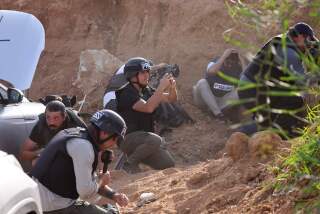TV REVIEWS : ‘Dangerous Assignments’ Victimized by Good Intentions
- Share via
These are not good days for members of the press. Throw them into harm’s way--like Peter Arnett in Baghdad--and they get accused of “giving aid and comfort to the enemy.” And if they complain about Pentagon censorship, they’re accused of being less than patriotic.
Then, when a report comes along that attempts to dramatize the plight of adventurous investigative journalists, it comes across with all the flatness of a promotional spot. “Dangerous Assignments” (tonight at 9 on Channels 28 and 15) becomes a victim of its own best intentions.
Those intentions are to show hard-working reporters in Peru, the Philippines and South Africa faced with the inevitable results of tough investigations done without the comfort of the First Amendment. In Peruvian Hugo Bustios’ case, it meant death. For Marites Vitug, exposing the systematic destruction of Philippine rain forest, it meant a chilling lawsuit. For Max du Preez, an Afrikaaner newspaperman opposed to apartheid, it might mean the shutdown of his daily paper.
All of them deserve more than the scattershot 15 minutes they’re given. Especially when another 15 minutes are taken up by a bland, ego-boosting discussion with those world champions of dangerous reporting, network anchormen Bernard Shaw, Peter Jennings and Tom Brokaw (moderated by a lethargic Robert MacNeil).
Although Shaw’s comments--taped last December--about getting “bounced” out of a country are ironic in light of his now-famous Baghdad dispatches for CNN, the anchors’ personal accounts of field reporting are almost distasteful after we’ve seen Hugo Bustios’ extraordinary sacrifice. Once again, in an effort to defend itself, the American press shoots itself in the foot.
More to Read
The complete guide to home viewing
Get Screen Gab for everything about the TV shows and streaming movies everyone’s talking about.
You may occasionally receive promotional content from the Los Angeles Times.






